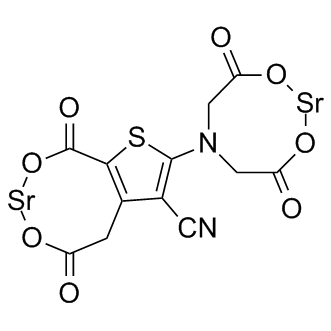
Strontium ranelate
CAS No. 135459-87-9
Strontium ranelate( Distrontium renelate | S-12911 )
Catalog No. M11444 CAS No. 135459-87-9
A strontium(II) salt of ranelic acid that stimulates CaSR and leads to the differentiation of pre-osteoblast to osteoblast, increases the bone formation; also stimulates osteoblasts to secrete osteoprotegerin in inhibiting osteoclasts formed from pre-osteoclasts in relation to the RANKL system.
Purity : >98% (HPLC)
 COA
COA
 Datasheet
Datasheet
 HNMR
HNMR
 HPLC
HPLC
 MSDS
MSDS
 Handing Instructions
Handing Instructions
| Size | Price / USD | Stock | Quantity |
| 25MG | 43 | In Stock |


|
| 50MG | 71 | In Stock |


|
| 100MG | 105 | In Stock |


|
| 200MG | 177 | In Stock |


|
| 500MG | 405 | In Stock |


|
| 1G | Get Quote | In Stock |


|
Biological Information
-
Product NameStrontium ranelate
-
NoteResearch use only, not for human use.
-
Brief DescriptionA strontium(II) salt of ranelic acid that stimulates CaSR and leads to the differentiation of pre-osteoblast to osteoblast, increases the bone formation; also stimulates osteoblasts to secrete osteoprotegerin in inhibiting osteoclasts formed from pre-osteoclasts in relation to the RANKL system.
-
DescriptionA strontium(II) salt of ranelic acid that stimulates CaSR and leads to the differentiation of pre-osteoblast to osteoblast, increases the bone formation; also stimulates osteoblasts to secrete osteoprotegerin in inhibiting osteoclasts formed from pre-osteoclasts in relation to the RANKL system; a medication for osteoporosis treatment.Osteoporosis Approved.
-
In VitroStrontium Ranelate (0.1-1 mM; 22 days; Mouse calvaria cells) treatment shows the expression of mRNA for early osteoblast markers (alkaline phosphatase, ALP) is visualized by day 5, while late markers (osteocalcin, OCN) are detectable only by day 15 and beyond.Strontium Ranelate (0.1-1 mM; 22 days; Mouse calvaria cells) treatment results in significantly increases the mRNA expression of the osteoblastic markers ALP, BSP and OCN at day 22 of MC cell culture.Strontium Ranelate is found to increase alkaline phosphatase activity and prostaglandin E2 production in a COX-2 dependent manner in murine marrow stromal cells. RT-PCRCell Line:Mouse calvaria (MC) cells Concentration:0.1 mM, 0.3 mM or 1 mMIncubation Time:22 daysResult:The expression of mRNA for early osteoblast markers (ALP) was visualized by day 5, while late markers (OCN) were detectable only by day 15 and beyond.Western Blot AnalysisCell Line:Mouse calvaria (MC) cells Concentration:0.1 mM, 0.3 mM or 1 mMIncubation Time:22 days Result:Significantly increased the mRNA expression of the osteoblastic markers ALP, BSP and OCN at day 22 of MC cell culture.
-
In VivoStrontium Ranelate increases bone formation and decreased bone resorption, which results in increased bone mass in the vertebrae of intact adult mice. In intact adult rats, Strontium Ranelate also increases bone mass, as measured by dual-energy X-ray absorptiometry, in lumbar vertebra and femur, and this is confirmed by histological assessment of trabecular bone volume in the tibial metaphysis.Strontium Ranelate is found to decrease bone resorption and to increase bone formation in alveolar bone in normal adult monkeys (Macaca fascicularis), which exhibits extensive bone remodeling.In ovariectomized rats, short-term (3 months) treatment with Strontium Ranelate prevents trabecular bone loss induced by oestrogen deficiency, as demonstrated by bone ash, bone mineral content and histomorphometric analysis in the tibial metaphysis. This effect results from decreased bone resorption while bone formation was maintained. These beneficial effects of Strontium Ranelate on bone mass and microarchitecture in ovariectomized rats are confirmed in long-term experiments. In this long-term study (2 years), the increase in bone mass and microarchitecture induced by Strontium Ranelate results in a marked improvement in bone strength, supporting the beneficial effect of this drug on bone resistance.
-
SynonymsDistrontium renelate | S-12911
-
PathwayGPCR/G Protein
-
TargetCaSR
-
RecptorCalciumChannel
-
Research AreaMetabolic Disease
-
IndicationOsteoporosis
Chemical Information
-
CAS Number135459-87-9
-
Formula Weight513.4896
-
Molecular FormulaC12H6N2O8SSr2
-
Purity>98% (HPLC)
-
SolubilityDMSO: < 1 mg/mL
-
SMILESO=C([O-])CC1=C(C([O-])=O)SC(N(CC([O-])=O)CC([O-])=O)=C1C#N.[Sr+2].[Sr+2]
-
Chemical Name3-Thiopheneacetic acid, 5-[bis(carboxymethyl)amino]-2-carboxy-4-cyano-, strontium salt (1:2)
Shipping & Storage Information
-
Storage(-20℃)
-
ShippingWith Ice Pack
-
Stability≥ 2 years
Reference
1. Hamdy NA. Rheumatology (Oxford). 2009 Oct;48 Suppl 4:iv9-13.
2. Chu JG, et al. BMC Musculoskelet Disord. 2017 Feb 10;18(1):78.
3. Tsai TT, et al. PLoS One. 2017 Jan 4;12(1):e0167296.
molnova catalog



related products
-
Cinacalcet hydrochlo...
A calcimimetic agent that acts as an allosteric activator of CaSR.
-
Ronacaleret
A potent calcium sensing receptor (CaSR) negative allosteric modulator with IC50 of 146 nM for hCaSR.
-
Evocalcet
Evocalcet has an activating effect on the calcium-sensing receptor (CaSR).



 Cart
Cart
 sales@molnova.com
sales@molnova.com


